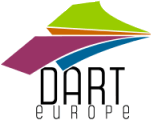Kalocsai Karolina
Communities of practice and English as a lingua franca: A study of Erasmus students in Szeged.
Doktori értekezés, Szegedi Tudományegyetem (2000-).
(2011)
(Kéziratban)
Előnézet |
PDF
(disszertáció)
Download (1MB) |
Előnézet |
PDF
(tézisfüzet)
Download (315kB) |
Előnézet |
PDF
(tézisfüzet)
Download (329kB) |
Előnézet |
PDF (Word to PDF conversion (via antiword) conversion from application/pdf to application/pdf)
(melléklet)
Download (7kB) |
Absztrakt (kivonat) idegen nyelven
The aim of my dissertation is to describe the complexities of English as a lingua franca (ELF) as it is used by a group of Erasmus exchange students engaged in social practice. My research was begun while I was working with the LINEE project, which made me realize that for a better understanding of the Erasmus exchange students’ linguistic situation, the analytic focus had to be on language use in its social context. To that end, I adopted the community of practice model, which relies quite specifically on ethnographic techniques for collecting data, qualitative methods for analyzing social practices, and discourse analytic methods for analyzing linguistic practices. The participants were 142 Erasmus exchange students who studied temporarily at the University of Szeged, Hungary. The data collection spanned a whole academic year. The data sources included audio-taped and transcribed interviews, audio-taped and transcribed naturally occurring interactions, field notes, prompted e-mails, online posts by the students and circular e-mails by the students. By focusing on shared practices and resources that the participants imbued with meaning, the analysis indicates that the Szeged Erasmus students indeed built a community of practice during their relatively short stay in Hungary. The shared practices emerged to achieve the goal of building a friendship and “family” based local social network with a focus on fun and self-confidence. The shared practices involved “spontaneous” as well as “ritualized” code-switching, yet, most of the practices were in English. In the Szeged Erasmus community English was a key shared practice: it helped the participants to build shared negotiable resources (1) for accomplishing everyday ritual tasks; (2) for making humor in the language and also about the language; and (3) for repairing the problematic moments of word search and non-understanding. Given that for the vast majority of the participants English was an additionally learnt language, the analyzed linguistic practices are necessarily interpreted as ELF practices. The analysis indicates that for the Szeged Erasmus students English was a facilitator. In case of lacking other shared languages, it was the most important means of connecting both with the other Erasmus students and with the local peers. Further results of this study show that through developing their shared resources, the participants created through practice their own “version” of ELF. That is, they made the fleeting, changeable nature of ELF “fixed” to the extent that it helped them define themselves as a group. Furthermore, the participants of the present study were users of English, in the first place, and learners of English in the second place. That is, they exploited their non-nativeness and demonstrated their “language learner” roles by choice, as and when appropriate, as a way of exploiting their shared resources. Finally, the Szeged Erasmus students creatively exploited their plurilingual repertoires. However, their code-switching was more for the creation of humor, rapport, and a “family” than for achieving intelligibility or signaling linguacultural identities. The dissertation points to the conclusion that there is a need for a careful understanding of the social context in which ELF is used or is developing.
| Mű típusa: | Disszertáció (Doktori értekezés) |
|---|---|
| Publikációban használt név: | Kalocsai Karolina |
| Magyar cím: | Gyakorlóközösségek és az angol mint lingua franka: Tanulmány a szegedi Erasmus hallgatók egy csoportjáról |
| Témavezető(k): | Témavezető neve Beosztás, tudományos fokozat, intézmény MTMT szerző azonosító Peckham Donald W. senior assistant professor, Department of English Language Teacher Education and Applied Linguistics, University of Szeged NEM RÉSZLETEZETT Langman Juliet associate professor of Applied Linguistics, Department of Bicultural - Bilingual Studies at UT - San Antonio NEM RÉSZLETEZETT |
| Szakterület: | 06. Bölcsészettudományok > 06.02. Nyelvek és irodalom > 06.02.06. Nyelvészet |
| Doktori iskola: | Nyelvtudományi Doktori Iskola |
| Tudományterület / tudományág: | Bölcsészettudományok > Nyelvtudományok |
| Nyelv: | angol |
| Védés dátuma: | 2011. május 17. |
| EPrint azonosító (ID): | 775 |
| doi: | https://doi.org/10.14232/phd.775 |
| A feltöltés ideje: | 2011. máj. 10. 06:55 |
| Utolsó módosítás: | 2021. júl. 07. 08:30 |
| Raktári szám: | B 4875 |
| URI: | https://doktori.bibl.u-szeged.hu/id/eprint/775 |
| Védés állapota: | védett |
Actions (login required)
 |
Tétel nézet |

 Repozitórium letöltési statisztika
Repozitórium letöltési statisztika Repozitórium letöltési statisztika
Repozitórium letöltési statisztika




